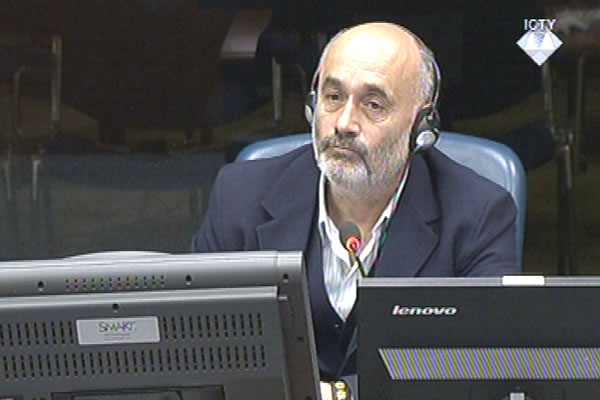Home
THIN LINE IN MLADIC WITNESS'S HEART
Boro Tadic, former head of the Sanski Most Military District, admitted that during the war he ‘assigned for use’ non-Serb civilians. They were used to dig trenches at the front lines. In Tadic’s view, that was in line with the Geneva conventions because the commanders made sure the civilians were safe. Asked to define the 'thin line' between hazardous and safe work at the front lines, the witness replied that he made that distinction ‘in his heart’
 Boro Tadic, defence witness at Rako Mladic trial
Boro Tadic, defence witness at Rako Mladic trial In his statement to Mladic’s defense team, former head of the Sanski Most Military District Boro Tadic tried to paint as positive a picture as possible ofthe situation in the municipality. During the war, the municipality was under the Bosnian Serb control. In Tadic’s view, the Serb leadership ‘was looking for a long time for a formula that would make it possible for everyone to live together’, but the war broke out eventually, thanks to Muslims and Croats. According to Tadic, they established paramilitary units and withdrew from the JNA. This course of events was a ‘blessing from God’because the Yugoslav army was thus transformed into the Serb army.
In his statement, the witness explained that he didn’t know anything about the policy of persecution, killing or discrimination aimed against non-Serbs. In Tadic’s view, all the residents in the municipality enjoyed equal rights. Tadic didn’t deny that Muslims and Croats left Sanski Most but it happened as part of the ‘population exchange’.
The prosecution alleges that the crimes in Sanski Most were systematic and reached the scale of genocide. The execution of civilians in the village of Skrljevita in November 1992 is one of five mass murders listed in the indictment. Military documents showing that the perpetrators were identified in the immediate aftermath of the crime were admitted into evidence. Danilusko Kajtez headed the group of killers. All four perpetrators –two of whom were minors –were prosecuted in Banja Luka. That didn’t prevent one of the perpetrators, Goran Vukojevic, from joining the Bosnian Serb army as soon as he came of age. The prosecutor presented the certificate of military service signed by the witness. Vukojevic used the certificate to justify his absence from the trial. Tadic remarked that everyone was presumed innocent until proven guilty. The certificate he had signed was legal, Tadic added.
The prosecutor put it to the witness that all 18 mosques in Sanski Most were destroyed. The witness confirmed the allegation. Tadic didn’t deny that the Executive Board considered digging up the two Muslim cemeteries in the town in February 1993. According to the prosecutor, that was done to ‘eliminate all trace’of Muslims from Sanski Most. Tadic begged to differ, explaining that he didn’t know why it had been considered. He also noted that he didn’t take part in any such discussions. The prosecutor showed the witness a document of the Prijedor State Security Service from March 1994, demanding that mass graves containing the remains of non-Serbs killed in the he villages around Sanski Most be destroyed. Tadic admitted that it ‘can be interpreted as a bid to hide the bodies’of the victims, but didn’t want to speculate on the reasons.
The prosecutor put it to Tadic that he knew about the illegal treatment of male non-Serbs in Sanski Most. As the military district chief, the witness was responsible for drafting them into work units which were used to dig trenches at the front lines and to clear minefields. Tadic admitted that he drafted the civilians; nevertheless, the witness argued that the military commanders in the units where the men were 'assigned for use'were responsible for the civilians’fate. To justify the commanders and himself, Tadic explained that they cared about the safety of the people who did the digging. According to the witness, the civilians in work units had it easier than the Serbs in combat units. Asked if he knew that hundreds of non-Serbs he had drafted into work units were killed while digging trenches, Tadic replied that he didn’t remember such ‘details’.
Presiding judge Orie joined the discussion, reminding the witness that in his statement he claimed that the Serb side had insisted on observing the Geneva Conventions. The presiding judge asked Tadic if sending civilians to dig trenches was in line with the document. Tadic replied that it was, as long as the commanders made sure civilians were safe. ‘You have drawn a very thin line between digging trenches in life-threateningand in safe conditions, but where in the Geneva Conventions do you find the basis to do that’, the presiding judge asked Tadic. ‘I make this distinction in my heart’, the witness replied readily.
Milovan Milutinovic, head of the Information Service in the VRS Main Staff, will give evidence tomorrow.
Linked Reports
- Case : Mladic
- 2014-12-16 ‘TRICK’ TO PREVENT NATO STRIKES
- 2014-12-16 WHO NEEDED WAR IN BH?
- 2014-12-16 WITNESSES ROLL OFF ASSEMBLY LINE
- 2014-12-18 HEAD OF MLADIC’S INFORMATION SERVICE CLAIMS HE DID NOT RECEIVE INFORMATION
- 2015-01-19 WHY AND WHEN DID MUSLIMS LEAVE PRIJEDOR?
- 2015-01-20 WAR CRIMES COMMITTED BY 'OUT OF CONTROL INDIVIDUALS'
